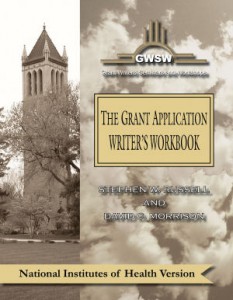Probably among the most commonly used words in grant proposals is the verb/noun “(to) understand”. Applicants very frequently plan grant applications that have been designed to “understand” something, whether an explanation for a certain social phenomenon, a biochemical pathway, clarification of an as yet to be identified series of observations, or even a way to explain the underlying reasons for a given historical event. Thus, how common it is to read: “The objective in this proposal is to understand the underlying reasons for…”. Alternatively, there are those applicants who feel it important to be…
ACCESS EARLIER POSTS
RELATED TO:
GWSW Workbooks offer comprehensive, step-by-step instruction for creating proposals for a variety of funding agencies.
MOST RECENT OTHER FUNDING AGENCIES RELATED BLOGS
Part 2: Dangerous words to avoid in grant applications
Would you like to make an immediate positive impression with reviewers?
Ask any experienced NIH reviewer about their experiences in reviewing NIH grant applications and they’re likely to provide you with a spectrum of answers in the way that they think about proposals (and the applicants who have written them). Nevertheless, it is remarkable how many very fundamental issues that reviewers identify as positive, are relatively common among all reviewers…
Part 1: Dangerous words that should be avoided in grant proposals
Two words that should usually be avoided by applicants in preparing their grant applications are “IF” and “WHETHER”. These words represent distinct manifestations of the same concept, since “If” implies “It might or it might not”, and “Whether” always provides for the option “Whether or not”. The primary problem with their use is that they both provide opportunities for a negative outcome to occur. While it is certainly possible that either a positive or an alternative…
Would you like to hone your proposal writing skills?
Experienced applicants, reviewers and funding agency officials generally agree that of the best ways to become a better proposal writer is to serve as a reviewer of proposals and most federal funding agencies provide opportunities to do this. The underlying reasons for being proactive in seeking out such opportunities are multiple. First, you will have the opportunity to observe the review process “up close and personal” which is likely to radically…
How to be successful in writing peer-reviewed grant applications?
This important question was addressed in a recent detailed analysis of published manuscripts (Acad Med. 2015 Dec;90(12):1720-5 J.P.Wisdom, H. Riley and N. Myers). Based on their comprehensive analysis, these authors have formulated 10 specific recommendations for what individual applicants and their affiliated institutions need to do in order to…

